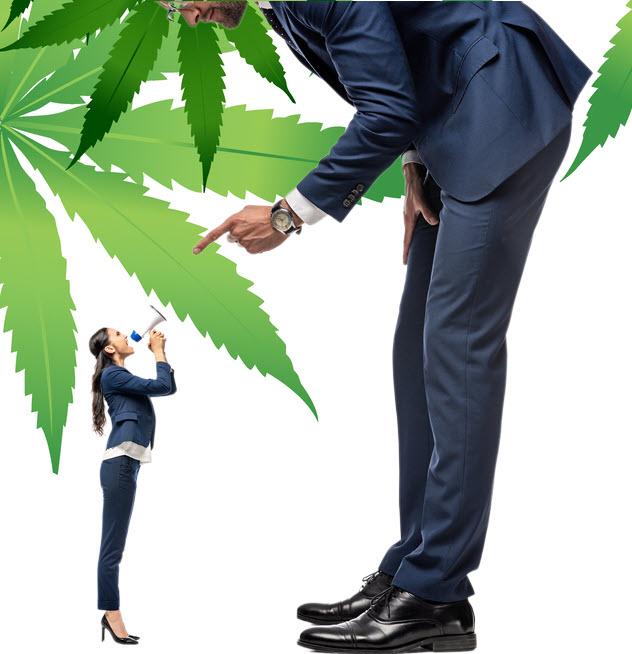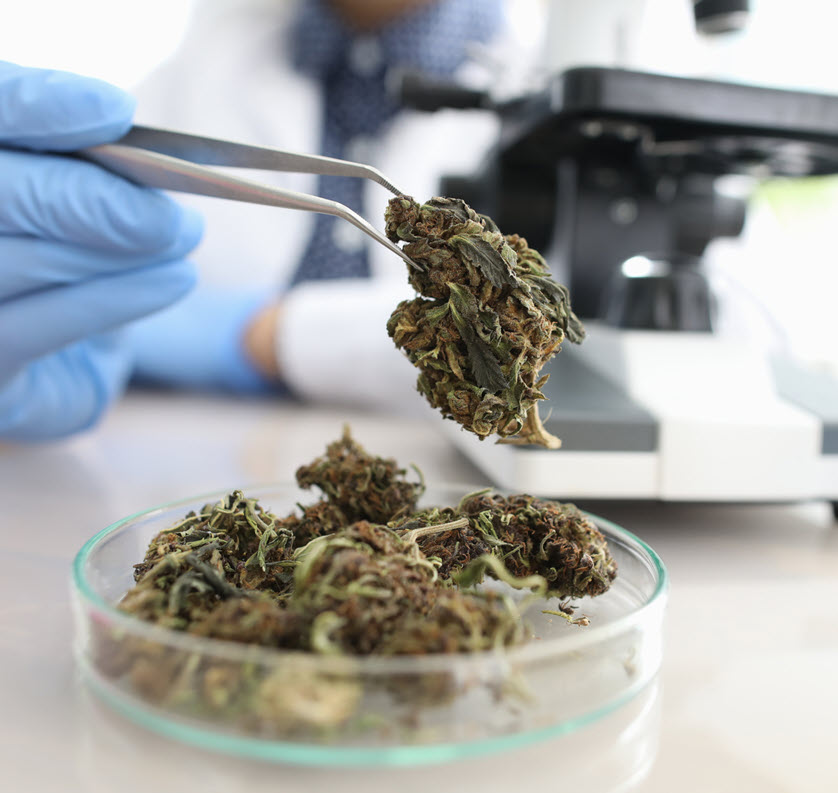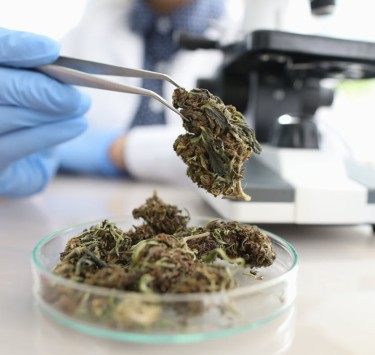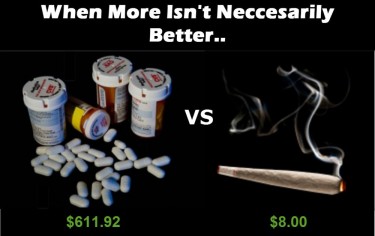Cannabis News
The Top 10 Cannabis Stories of 2023
Published
1 year agoon
By
admin

Reginald Reefer’s Top 10 of 2023 – Cannabis Yearly Round up!
As we’re coming to the end of 2023, I think it’s “high time” to create my yearly summary of most important/interesting/viewed cannabis related stories of 2023.
Earlier this year I walked us through the modern history of cannabis, and when I reached this year, I said, “There’s just so much shit that happened this year that I’d write an article about it dedicated to the whole year…”
Well, this is that article.
So here goes Reginald Reefer’s Top 10 of 2023!
P.S – This is in no particular order. That shit is hard to quantify.
STORY 1: Federal Court Rules Gun ban for cannabis users unconstitutional
Kicking off our top ten, we have a big win for civil liberties and cannabis rights. A federal appeals court ruled the federal ban prohibiting cannabis consumers from owning firearms unconstitutional. Judges rejected the Justice Department’s arguments attempting to justify disarming marijuana users as an historical precedent.
The ruling states nothing in 18th or 19th century laws specifically restricted gun ownership for those using intoxicating substances. While laws regulated firearms and intoxicants separately, no legislation singled out substance users for firearm bans.
The court even cited the Founding Fathers’ familiarity growing hemp for practical uses, noting they remained unaware of modern cannabis consumption methods. But this nuance only highlights the absurdity of restricting civil rights around a agricultural product humans cultivated beneficially across centuries.
Especially considering alcohol’s notoriety fueling violence, the opinion states past laws never disarmed regular drinkers later while sober. So even present problematic behaviors like drunk driving remain circumstantial, not blanket justifications for rescinding basic constitutional rights.
The ruling does allow prohibiting intoxicated individuals from immediately possessing guns given temporary impairment concerns. But overall it affirms no sufficient legal grounds exist constricting ownership rights of sober citizens based on extracurricular substance use alone.
This precedent promises immense impact litigation-wise by finally uprooting a stubborn pillar of the drug war threatening owners. It signals the welcome erosion of the thin justifications underpinning prohibition policies from increasingly untenable positions.
While citizens celebrate expanding liberties on one social frontier, global digital frontiers also shift…
Story 2: Twitter (X) becomes first social media platform to allow cannabis businesses to advertise
While expanding rights on one social frontier, the next story profiles a pioneer crossing new digital frontiers – Elon Musk. His Twitter platform made history as the first major social media outlet officially allowing state-legal cannabis companies to advertise.
Contrast this to more puritanical sites still banning cannabis ads despite changing public attitudes. Musk’s maverick move aligns with his disruption of stagnant industries, applying libertarian principles of open commerce and free speech to emerging sectors.
By welcoming this growing cannabis industry onto global communications conduits, Musk catalyzes incredible opportunities while highlighting the silliness of lingering stigma in 2023. We know advertisers will be chomping at the bit to utilize these new channels and that competitors will eventually follow suit.
Once all social platforms inevitability open doors after Twitter’s lead, prepare for an interstellar level marketing war blitzing through screens daily. The cannabis sector just gained prime territory for brand visibility and unprecedented direct customer access almost overnight thanks to unorthodox innovation.
This unpredictable industry liberation perfectly encapsulates Musk himself – a visionary guided by first principles quickly executing what others dismiss as impractical or extreme. His instincts for undervalued ventures produce immense shifts.
And despite some polarizing aspects, Musk consistently foregrounds individual liberty in business and culture above restrictive gatekeeping. This maverick ethos explains the characteristic boldness in welcoming a controversial sector scorned by self-important arbiters of propriety. But the profits will speak volumes.
By empowering enterprise freedom and consumer choice simultaneously with this watershed cannabis move, Musk’s Twitter embodies the frontier spirit crossing boundaries to unlock progress. The ripples from this unprecedented social media brand integration will likely transform economies and attitudes alike.
Speaking of the tragic toll when boundaries overstep in limiting freedoms, our next item also made international headlines.
Story 3: Britney Griner released from Russian Prison for cannabis
Speaking of the unjust toll when laws overstep reasonable boundaries, our next story profiles the harrowing ordeal of basketball icon Brittney Griner. Russian authorities arrested then convicted her of possessing less than 1 gram of cannabis oil through draconian measures. Despite the recent US state-level reforms, Griner’s case illustrated the drastic global legal discrepancies still surrounding the plant that can disrupt lives.
Initially sentenced to nine grueling years in prison, Griner endured nearly a year of harsh penal captivity before returning home through a prisoner exchange deal. But no personal possession amount deserves such disproportionate state coercion disrupting careers and liberty by any ethical standard.
Griner’s high-profile incident encapsulates the ultimate irrationality underpinning any carceral model around consensual adult cannabis use or possession. No practical or moral logic supports incarcerating non-violent individuals for utilizing traditionally safe botanical remedies.
Yet obsolete cultural myths around certain psychoactive flora pervade globally through colonialist residues, sustaining inhumane policies. So while celebrating Griner’s overdue release, the hypocrisy still rings loudly considering America imprisons thousands for equally minor cannabinoid offenses. Vindictive systems profit from this theater measuring “justice”.
The case highlighted truth that until fully embracing enlightened harm reduction regulations, needless suffering persists around ingesting elements of common plants. No healing herbs justify stripping security and community from individuals.
While applauding Griner’s inspirational grace under fire, this injustice spotlights why more citizens reassess the war on human nature pharmaceutically waged upon us without consent. For no happiness should hinge on permission slips for flowers or fungi. Our next story explores this prohibition’s erosion as public opinion cultivates conscientious policy soil.
A new poll reveals most Americans agree the drug war constitutes failed governance requiring urgent overhaul. When even Republicans concur after 50 years of immeasurable costs, the people signal to cease allowing state violence disguising moralism. The tides turn.
Story 4: Massive Study of over 63 million people found cannabis legalization does not lead to increased psychosis diagnoses
A massive new study rebuts a common legalization objection – that increasing cannabis access theoretically promotes psychotic disorders in the population. Prohibitionists often argue this mental health speculation justifies restricting adult access. But groundbreaking data now challenges this narrative.
Recently researchers evaluated a pool of 63 million Medicare recipients over 14 years contrasting psychosis rates and state policy shifts around legalized medical and recreational cannabis. This enormous sample size produced perhaps the most definitive insights to date into this lingering public health concern.
If prohibitionist rhetoric held weight, liberalizing laws expanding cannabis commerce should reveal spikes in related clinical psychosis diagnoses as usage patterns hypothetically shift. But intriguingly, no statistically significant uptick emerged at all across the regions or demographics.
In fact psychotic disorders rates flatlined through the advent of major liberalization reforms. This real-world correlation disputes dire warnings about the dangerous mental health influence of store-bought cannabis. Although paradoxically, no parallel concern exists limiting alcohol linked frequently to psychosis despite its less promising research profile.
While not implying outright cannabis-psychosis causality, the political exploitation of this exaggerated uncertainty to deny adult access faces deep scrutiny now. These latest findings align with prior studies finding no concerning population impact from regulated expansion.
If anything, the robust data suggests improved product quality control and clinical oversight through legal channels optimizes harm reduction over uncontrolled criminalization. And the sheer statistical scope reinforces confidence – over 60 million patient records spanning a decade and half across all states represents authoritative perspective.
This revelations promise profound influence informing future drug policy discussions by deflating a once presumed Achilles’ heel argument against reform. While research continues shedding light, old boogeymen lose teeth rapidly on the march towards national normalization.
Story 5: CDC Study finds cannabis legalization leading to lower teen use
Shifting focus to America’s youth, a promising new CDC study discovered no increase and even declines in teen cannabis use correlated to adult-use legalization reforms. This counterintuitive finding contradicts longtime warnings from prohibitionists insisting state retail expansion would exacerrate youth consumption and addiction rates.
Analyzing extensive federal survey data spanning years before early legalization experiments up through recent times, the trends grew increasingly clear – young cannabis usage has dropped steadily across the board from peak levels in 2009-2013 as more jurisdictions embrace regulated adult-use models.
In fact teen usage rates accelerated their ongoing dip post-2013 when Colorado and Washington first pioneered the state-level adult-use paradigm. This real-world result powerfully refutes rhetoric insisting legal storefronts and advertising would normalize pot smoking among kids.
Across every metric – monthly use, yearly use, lifetime use – the CDC found teenage relationship with cannabis not only failed to intensify but solidified substantial downward shifts in the prohibitionist claimed legalization fallout. This remained consistent even accounting for anomalous pandemic years disrupting substance access through isolation policies.
The credible data aligns with early results from initial legalization pioneer states showing youth use declining despite access expanding for adults. Colorado youth currently use cannabis at lower rates than national averages.
While further study must continue contextualizing multiple influencing societal variables, this CDC analysis importantly demonstrates real-world legalization implementation curtailing underage consumption rather than stoking it.
These insights carry immense weight informing states still fearfully abstaining from reform. As scientifically unfounded worries around promoting youth use dissolve under factual scrutiny, the rationale for delaying aligned public policy weakens further. And communities witness how social openness allows better oversight than blanket demonization.
Story 6: Singapore Executes Man for 2 Pounds of Pot
While legal access progresses domestically, our next disheartening story examines the tragic cost of outdated international prohibition. Despite waves of reform recently washing over even Asian regions, Singapore maintains draconian anti-drug laws including executing citizens caught possessing now mundane amounts of innocuous botanicals like cannabis.
This regressive regime recently took the life of an allegedly non-violent 46-year old Singaporean man convicted of possessing just two pounds of cannabis he planned to distribute. Despite no demonstrated harm or history of prior offenses, he received the death penalty simply for the plant matter contraband charge.
Human rights groups universally decried the disproportionate sentence for a two pound cannabis case. But Singapore officials dismissed criticism of its lethal “zero tolerance” anti-drug stance. The nation stubbornly clings to War on Drugs militant tactics including forced rehabilitation camps and routine execution seemingly impervious to data showing counterproductivity.
The incident sharply contrasts liberalizing attitudes in nearby countries also easing enforcement. While Thailand approved decriminalization last year, Malaysia recently abolished mandatory death penalties for drug charges as global opinion shifts. This makes the continued programmed barbarity by Singapore appear increasingly archaic and backwards by any ethical measure.
By executing a man for two pounds of healing flower pods, the ostensibly modern regime reveals ideological vestiges of colonialism viewing agriculture with spiritual ritual usage as an existential threat warranting ultimate suppression. But such denial of cognitive sovereignty through violence universally backfires by breeding resentment and more dangerous clandestine markets.
One can only hope Singapore soon recognizes the self-sabotage of clinging to disproven militant models against naturally desired plants. But this tragic loss spotlighting unchecked power seeking total coercion cannot be unlived. Perhaps his senseless death nourishes the soil where enlightened drug policy may finally bloom one day in his homeland. For now – darkness.
Our next story eulogizes a differently impactful figure lost recently – the Israeli “Father of THC” Raphael Mechoulam…
Story 7: Death of a Cannabis legend – Dr. Ralph Mechoulam
Shifting from tragedy to tribute, our next item honors the recent passing of Raphael Mechoulam – the pioneering Israeli organic chemist who revolutionized cannabis science through isolating THC and CBD. His research radically transformed global understanding of the plant’s composition and pharmacological mechanisms. All contemporary cannabis medicine owes a debt to his lifetime dedication.
Born 1930 in Bulgaria, Mechoulam immigrated to Israel in 1949 beginning what would become a storied seven decade journey plumbing cannabis’ secrets through exacting lab work. After securing research cannabis from the national police agency in the 1960s, his team successfully identified the previously unknown molecular structure of THC alongside later characterizing CBD.
This profound chemical elucidation single-handedly established the initial pharmacological architecture underlying the cannabis experience. His discoveriespopularized recognizing various cannabinoids and their distinct effects. Every nuggets’s precise psychoactive and medicinal potency today gets credited to Mechoulam’s lifetime cannabis illumination.
Honoring his scientific contributions, Mechoulam received prestigious international accolades including an honorary doctorate from Complutense University in Madrid. The American Chemical Society named the organic cannabinoid pharmacophore after him.
Beyond isolated compounds, Mechoulam helped demonstrate the human body’s innate endocannabinoid system regulating metabolism through sites THC and CBD interact with. This further revolutionized understanding cannabis’ affinity supporting wellness. He authored over 400 published papers cementing his status as the undisputed patriarch of contemporary cannabis academics.
While passing at 92 years old, Mechoulam’s sense of exploration and dedication never waned even into his final years directing an Israeli national cannabinoid research center. His lifetime teachings and mentorship investment ensures successors carry forth trailblazing in this young field. That immortal impact remains Mechoulam’s lasting gift to science – legitimizing and codifying the once taboo frontier of cannabis medicine. Generations further owe their alleviated suffering from this humble giant of organic chemistry done right.
Story 9: Study found that most Parkinson’s Symptoms alleviated with Cannabis use
Shifting focus to uplifting medical advances, our next item profiles cannabis gaining recognition addressing Parkinson’s – a debilitating degenerative nervous system disease confounding solutions for sufferers. But fresh clinical data reveals cannabis components effectively treating common disease symptoms where other treatments fail.
Researchers conducted a retrospective study examining 69 Parkinson’s patients already utilizing state-legal medical cannabis to manage disease burdens. Investigating numerous metrics like symptoms changes, medication changes, side effects and more, a resounding majority – 87% – reported overall improvement from MC addition controlling issues like chronic pain, tremors, and insomnia.
Equally promising, over half the Parkinson’s users also lowered or discontinued conventional medications under medical guidance after adding cannabis – suggesting its comparative efficacy and safety. This aligns with substituted prescription declines in older populations using cannabis for issues like chronic pain management and insomnia.
The accumulating indications powerfully support legal access allowing clinicians responsibly incorporating cannabis alongside traditional modalities as appropriate for given individuals. While more controlled trials are still needed, real-world findings confirm people discover extensive benefit from its anti-inflammatory, analgesic and neuroprotective properties where pharmaceuticals disappoint.
So rather than restricting through outdated cultural stigma, this latest study suggests carefully expanding and personalizing cannabis’s therapeutic utilities may provide a missing treatment puzzle piece for misunderstood conditions like Parkinson’s. Its multifaceted neuromodulatory chemistry further illuminates possibility spaces for intractable neurodegenerative disease.
And that broader healing hope touches our final story in this cannabis journey depicting the changing cultural currents leading inevitably towards sane, compassionate policy honoring this ancient plant ally supporting eons of humankind’s health. But obsolete power constructs currently deny this destiny. Their facade now crumbles.
Story 10: Snoop Dogg Trolls the world
Our cannabis journey concludes with monumental marketing mischief from the master himself – Snoop Dogg. By tactically tweeting he was mysteriously “quitting smoke” after decades of signature cannabis advocacy, the rap icon tricked global media into reporting his retirement from weed…or so it seemed.
The cryptic tweet instantly made international headlines as outlets rushed obituaries mourning the loss of Snoop’s stoner persona. Twitter exploded in speculation – was it health issues? A religious awakening? Many fans wrote moving tributes eulogizing the career-spanning blunt buffoonery.
But just days later Snoop revealed the ruse in a commercial for a smokeless firepit – he meant tobacco smoke, not bud! The switcheroo wasted no time converting mass publicity into selling Solo Stove’s product. Snoop hadn’t abandoned weed at all – he’d effortlessly finessed free advertising through weaponizing public perception.
In the end, the stunt generated nearly 160 million views on a single tweet containing two sentences. Global engagement metrics rarely seen for any price. And it required no costly media buys – simply leveraging Snoop’s celebrity and grassroots trust for devastating impact.
The marketing masterclass amplified intrigue by cryptically offering just enough dramatic bait before the commercial punchline hit days later. He consciously left the tweet narrative open to grab attention without context before clarifying later.
In actuality, the ploy proved more social commentary on lingering reefer madness stigma than abandoning personal principles. As media rushed demonizing content, it revealed stubborn anti-cannabis biases persisting culturally. Snoop strung them all along easily through minimal smoke and mirrors.
By parodying public cannabis narratives, the saga spotlighted protest prohibitionists’ continued disproportionate influence politicizing plant wisdom without pragmatic perspective. Snoop hoisted detractors on their own faulty petard for profit and activism both. For in destigmatizing justice persists. The maestro wins again.
The Sticky Bottom Line
And there you have it, my selection for the Top Cannabis related articles/stories that had the most impact on society during 2023. There was so much that happened this year that I’m sure I missed a lot, but at the end of the day I believe that these stories held the most weight for the cannabis community.
You know, come to think about it, the woman who stabbed her boyfriend 118 times after the fatal bong rip might also have been worthy, but to be honest, I don’t like to promote that kind of thinking. If you don’t know about that story, it’s pretty messed up.
Anyhow, let me know if there was a news worthy article I missed.
MORE ON THE CANNABIS YEARLY NEWS LEADERS, READ ON…
WHAT WERE THE TOP CANNABIS STORIES OF 2022 AND HOW DID IT GO?
You may like
-


Know About Boxing Day
-


25 Billion Reasons (and Counting) on Why Big Pharma Hates Marijuana Legalization
-


South Africa: Stop arresting cannabis users, Human Rights Commission urges police after complaints about arrests from Rastafarian community.
-


Breaking the Grass Ceiling: Pot firms rethink strategy as young women lead cannabis use
-


California New Laws for 2025: Cannabis Cafes and Entertainment Zones
-


This Company Wants To Pay You To Smoke Marijuana And Write ‘Amazing Reviews’
Cannabis News
25 Billion Reasons (and Counting) on Why Big Pharma Hates Marijuana Legalization
Published
1 day agoon
December 25, 2024By
admin

Real Reason Pharma Hates Weed
Sometimes I forget that not everyone has the same relationship with cannabis as I do. After spending over two decades researching, writing about, and experiencing the medical benefits of this remarkable plant, it’s become as normal to me as taking a daily vitamin. Cannabis is simply part of my wellness toolkit – a natural remedy that promotes balance and healing in ways that continue to amaze me.
But then I catch myself. I remember that for most of the world, cannabis still lurks in the shadows of illegality. Despite the growing wave of legalization, countless people remain in the dark about its therapeutic potential, their understanding clouded by decades of propaganda and misinformation.
Much of this ignorance can be traced back to Big Pharma’s influence over mainstream media and medical research. Through carefully crafted narratives and cherry-picked studies, they’ve painted cannabis as nothing more than a dangerous drug of abuse – just some “hippie grass” with no real medical value. It’s a masterful stroke of corporate manipulation that has kept millions from exploring this ancient medicine.
However, the truth has a way of emerging, especially in our digital age. Recent studies are painting a very different picture of cannabis – one that has pharmaceutical executives breaking out in cold sweats. Not only is cannabis proving effective for a wide range of conditions, but it’s also leading patients to reduce or eliminate their dependence on prescription medications.
Today, we’re going to explore these groundbreaking findings and expose the real reason Big Pharma is terrified of cannabis legalization. When you see the data on how this simple plant is impacting their bottom line, you’ll understand why they’ve fought so hard to keep it illegal.
So grab your favorite strain (if you’re in a legal state, of course), and let’s dive into the fascinating world of medicinal cannabis. What you’re about to learn might just change how you think about this controversial plant – and the companies trying to keep it out of your hands.
A groundbreaking yearlong study just published in the Journal of Pain and Palliative Care Pharmacotherapy has caught my attention, and believe me, it should catch yours too. The research followed 96 patients over 12 months, tracking their experiences with prescribed medical cannabis for chronic pain and mental health conditions. What they found wasn’t just impressive – it was downright revolutionary.
Let’s dive into the numbers, shall we? Within the first six months, patients reported significant pain reduction and improved mental well-being that continued throughout the entire year. We’re not talking about minor improvements here – a whopping 91% of participants reported their pain was “at least a little better,” with 75% declaring it was either “much better” or “very much better.”
But here’s where things get interesting, especially if you’re a pharmaceutical executive. By the study’s end, 55% of participants had reduced their prescription pain medication use, and 45% had cut back on over-the-counter pain medicines. The side effects? Mostly just dry mouth and sleepiness. Compare that to the novel-length list of potential complications from typical prescription pain medications.
And this isn’t an isolated finding. A separate review published in Cureus found that cannabinoids provided significant relief from chronic pain (33% versus 15% with placebo) with “minimal to no side effects.” The researchers went so far as to call it a “life-changing alternative” to conventional pharmaceuticals.
Another recent study revealed that 57% of patients with chronic musculoskeletal pain found cannabis more effective than their other analgesic medications, with 40% reducing their use of traditional painkillers after starting cannabis. The American Medical Association’s own research showed “significant improvements” in quality of life for people with chronic conditions like pain and insomnia, with effects “largely sustained” over time.
See the pattern emerging? Across multiple studies, we’re consistently seeing two things: cannabis works, and when it works, people need fewer pharmaceutical drugs. This isn’t just about pain medication either – patients reported decreasing their use of medications for depression, anxiety, and sleep problems too.
For those of us who understand cannabis, these findings aren’t surprising. But for Big Pharma, they’re absolutely terrifying. When half your patient base starts reducing their medication use by 40-55%, that’s not just a dent in profits – it’s a crater.
But here’s the kicker: the numbers I’ve just shared with you are just the tip of the iceberg. In our next segment, we’re going to translate these percentage drops in medication use into cold, hard cash. We’ll see exactly why pharmaceutical companies are spending millions lobbying against cannabis legalization, and trust me, when you see the figures, you’ll understand why they’re sweating.
Because let’s be honest – this isn’t about patient welfare anymore. It’s about protecting profit margins. And nothing threatens those margins quite like a plant people can grow in their backyard.
Let’s put these numbers into perspective, shall we? When we look at just one category of pharmaceutical drugs – say, prescription pain medications – we’re talking about a market worth over $25 billion annually. Now, imagine watching 40-55% of your customers walking away, choosing instead to use a plant they might be growing next to their tomatoes. That’s the nightmare Big Pharma is facing.
Research indicates that pharmaceutical companies lose approximately $10 billion annually in states with medical marijuana programs. And that’s just the tip of the proverbial iceberg. As more states legalize and more people discover cannabis’s therapeutic potential, these losses are projected to grow exponentially.
But here’s what really keeps pharmaceutical executives up at night: they can’t monopolize cannabis like they do with their synthetic drugs. Sure, they can create cannabis-based medications (and they are), but they can’t patent the plant itself. Mother Nature, in her infinite wisdom, made cannabis remarkably easy to grow and process.
Think about it – any moderately skilled home grower can produce a variety of cannabis medicines right in their backyard. Want to make a topical salve for arthritis? Just infuse some cannabis in coconut oil. Need something for sleep? You can make your own tincture. Looking for anti-inflammatory benefits without the high? Raw cannabis juice or leaves will do the trick. No pharmaceutical company required.
This accessibility terrifies Big Pharma because it completely circumvents their carefully controlled production and distribution systems. You don’t need a sophisticated laboratory or millions in equipment to create effective cannabis medicine. You need soil, water, sunlight, and a little knowledge passed down through generations of growers.
Even more threatening is cannabis’s versatility. One plant can potentially replace multiple medications. A patient might use cannabis to manage their chronic pain (goodbye opioids), help them sleep (see ya, Ambien), and ease their anxiety (farewell, Xanax). That’s three revenue streams dried up from a single plant growing in someone’s garden.
And let’s not forget about raw cannabis consumption – a method that completely bypasses the need for processing altogether. Raw cannabis contains THCA and CBDA (the acidic precursors to THC and CBD), along with hundreds of other beneficial compounds including terpenes and flavonoids. These compounds offer significant therapeutic benefits without any psychoactive effects, essentially giving patients a nutrient-dense superfood that doubles as medicine.
This is the real reason behind Big Pharma’s anti-cannabis stance. It’s not about safety concerns or public health – it’s about protecting their bottom line from a plant that threatens their entire business model. Cannabis represents everything they fear: a natural, effective medicine that people can grow themselves, process in their kitchens, and use to treat multiple conditions without ever stepping foot in a pharmacy.
No wonder they’re spending millions on lobbying against legalization. When your profit margin is threatened by a plant that literally grows like a weed, you’ve got a serious problem on your hands.
JG
Now let’s write a 350-word conclusion entitled, “The Sticky Bottom Line”
In this segment focus on:
* I believe that everyone should have access to medicine they can grow. I even favor people growing their own opium, coca plant, psychedelic mushrooms, etc. This all in the name of bodily autonomy.
* Getting people off pharmaceuticals and taking health into their own hands is one of the best things that could happen for humanity.
* The science backs cannabis as a medicine, and each day that we continue to stall on making it widely available to people in need, is another day we perpetuate suffering for no reason other than greed.
Here’s a 350-word “Sticky Bottom Line” conclusion:
Let me be perfectly clear about where I stand: I believe every human being should have the right to grow their own medicine. Whether it’s cannabis, poppies, coca plants, or mushrooms, bodily autonomy means having sovereignty over your own consciousness and the ability to manage your own health. The idea that we need corporate gatekeepers to mediate our relationship with plants that have been used medicinally for thousands of years is not just absurd – it’s morally reprehensible.
The evidence we’ve explored today paints a crystal clear picture: cannabis works. It helps people manage pain, reduces anxiety, improves sleep, and allows countless patients to reduce or eliminate their dependence on pharmaceutical drugs. This isn’t just anecdotal anymore – it’s backed by rigorous scientific research. Yet millions still suffer needlessly because an industry more concerned with profits than patients continues to obstruct access to this healing plant.
Every day we delay full cannabis legalization, we’re choosing to prioritize corporate profits over human welfare. We’re forcing people to remain dependent on expensive, often addictive medications when they could be growing a safer alternative in their backyard. We’re maintaining a system where healthcare is a privilege rather than a right, where healing is commodified and monetized rather than democratized and accessible.
The shift away from pharmaceutical dependence toward natural, self-grown medicine represents one of the most significant opportunities for improving human health and wellbeing in our lifetime. It’s not just about cannabis – it’s about reclaiming our right to heal ourselves, to make informed choices about our health, and to access the therapeutic tools nature has provided us.
The science is clear. The benefits are proven. The only thing standing between millions of people and potential relief is a profit-driven system that values patents over patients. It’s time to choose: will we continue to support a system that prioritizes profits over people, or will we finally embrace the healing power of plants that grow freely under the sun?
The choice, like the bottom line, is sticky indeed.
Inspiration: https://www.marijuanamoment.net/medical-marijuana-improves-chronic
-pain-and-mental-health-symptoms-while-reducing-prescription-drug-use-study-shows/
BIG PHARMA BLOCKING MARIJUANA LEGALIZATION, READ ON…
Cannabis News
How Do You Stop Lab-Shopping for the Highest THC Results?
Published
2 days agoon
December 24, 2024By
admin

In a decisive move aimed at bolstering consumer safety and ensuring the integrity of cannabis products, Massachusetts regulators have mandated that all cannabis products must undergo testing at a single, licensed laboratory. This new regulation comes in response to the growing issue of “lab shopping,” where cannabis producers seek favorable testing results by sending their products to multiple laboratories. The Massachusetts Cannabis Control Commission (CCC) announced this significant regulatory change after extensive consultations with industry stakeholders, public health officials, and consumer advocates.
This article explores the implications of this regulation for the cannabis industry, consumers, and public health. It also examines the broader context of cannabis regulation in Massachusetts and the potential impact of this decision on the future of the state’s cannabis market.
Understanding Lab Shopping
What is Lab Shopping?
Lab shopping refers to the practice where cannabis producers send their products to various testing laboratories in search of the most favorable results. Producers may choose labs based on their reputation for leniency or their history of providing positive results. This behavior can lead to significant discrepancies in product safety assessments and quality assurance.
The Risks Associated with Lab Shopping
1. Consumer Health Risks: The primary concern surrounding lab shopping is the potential risk it poses to consumer health. Inconsistent testing results mean that products containing harmful contaminants—such as pesticides, heavy metals, or mold—may be sold without proper scrutiny. This can lead to serious health issues for consumers who unknowingly purchase tainted products.
2. Market Integrity: Lab shopping undermines the integrity of the legal cannabis market. When consumers cannot trust that products have been tested rigorously and uniformly, it erodes confidence in legal cannabis sales and can drive customers back to illicit markets where safety standards are nonexistent.
3. Regulatory Challenges: For regulators like the CCC, lab shopping complicates enforcement efforts. It becomes increasingly difficult to monitor compliance when producers can easily switch labs to obtain favorable results, making it challenging to ensure that all products meet established safety standards.
The Regulatory Response
The Role of the Cannabis Control Commission (CCC)
The Massachusetts Cannabis Control Commission is tasked with regulating the state’s cannabis industry. As part of its mandate, the CCC has worked diligently to establish a comprehensive regulatory framework that governs various aspects of cannabis production and sale. However, as the industry has evolved, so too have the challenges associated with ensuring product safety and quality.
In light of growing concerns about lab shopping and its implications for public health and safety, the CCC recognized the need for a more robust regulatory framework. After extensive discussions with industry stakeholders and public health officials, the commission concluded that a single-lab testing requirement was necessary to address these issues effectively.
Implementation of Single-Lab Testing
In late 2023, following thorough deliberation and stakeholder engagement, the CCC announced its new regulation mandating that all cannabis products must be tested by a single licensed laboratory before they can be sold to consumers. This decision aims to achieve several key objectives:
-
Standardize Testing Protocols: By requiring that all products be tested by a single lab, regulators can ensure that all products are subject to consistent testing standards. This uniformity is crucial for maintaining product quality and safety across the market.
-
Enhance Accountability: A single-lab requirement makes it easier for regulators to hold laboratories accountable for their testing practices. If discrepancies arise in testing results, it will be clear which laboratory conducted the tests, facilitating more straightforward investigations.
-
Improve Consumer Confidence: With consistent testing results across all products, consumers can feel more secure in their purchases. This increased confidence is vital for fostering a healthy legal cannabis market in Massachusetts.
Implications of Single-Lab Testing
For Producers
1. Increased Accountability: Producers will need to establish relationships with specific laboratories and ensure that their products meet stringent quality standards before submission for testing. This shift will require producers to invest more in quality control measures throughout their production processes.
2. Potential Cost Implications: While single-lab testing may streamline processes for some producers, it could also lead to increased costs if producers are required to pay higher fees for comprehensive testing services. Smaller producers may find it particularly challenging to absorb these costs.
3. Adaptation Period: Producers will need time to adjust their operations and supply chains to comply with this new regulation. This may involve reevaluating partnerships with existing labs or investing in new quality control measures.
4. Impact on Product Development: The requirement for single-lab testing may also influence how producers develop new products. With fewer laboratories available for testing, producers may need to plan their product launches more carefully and allow additional time for testing processes.
For Laboratories
1. Increased Demand for Services: Licensed laboratories may experience an increase in demand as producers consolidate their testing needs with fewer facilities. This could lead to higher revenues for labs but also increased pressure on them to maintain high-quality standards amidst growing workloads.
2. Need for Enhanced Capabilities: Laboratories will need to ensure they have the capacity and technology necessary to handle increased volumes of samples while maintaining rigorous quality control measures. This may require investments in new equipment or hiring additional staff.
3. Regulatory Compliance: Laboratories will face heightened scrutiny from regulators as they become key players in ensuring product safety. They will need to demonstrate compliance with all relevant regulations and maintain transparent practices regarding their testing methodologies.
For Consumers
1. Improved Product Safety: The primary benefit for consumers is enhanced safety assurance. With standardized testing protocols in place, consumers can trust that cannabis products have been thoroughly vetted for contaminants and potency before reaching store shelves.
2. Greater Transparency: As part of this regulatory shift, there may be increased transparency regarding testing results and laboratory practices. Consumers will have access to clearer information about what goes into their cannabis products, empowering them to make informed choices.
3. Potential Price Increases: While improved safety is paramount, there is a possibility that compliance costs could be passed on to consumers through higher prices for cannabis products. Producers may need to adjust their pricing structures in response to increased operational costs associated with single-lab testing.
Cannabis Regulation in Massachusetts
Historical Overview
Massachusetts was one of the first states in New England to legalize recreational cannabis use following the passage of Question 4 in 2016. The legalization marked a significant shift in public policy and opened up a new economic sector within the state. However, as with any emerging industry, challenges quickly arose—particularly concerning product safety and quality assurance.
Existing Regulatory Framework
Prior to the introduction of single-lab testing regulations, Massachusetts had established a comprehensive regulatory framework governing various aspects of cannabis production and sale:
Despite these measures, lab shopping highlighted gaps in enforcement and compliance that necessitated further action from regulators.
Industry Reactions
Support from Public Health Advocates
Public health advocates have largely welcomed the CCC’s decision to implement single-lab testing as a crucial step toward safeguarding public health by ensuring that all cannabis products meet consistent safety standards. Many believe this regulation will help prevent contaminated or substandard products from reaching consumers while bolstering trust in legal cannabis sales.
Dr. Emily Thompson, a public health expert at Harvard University, stated, “This regulation is essential for protecting consumers from potential health risks associated with contaminated cannabis products.”
Concerns from Industry Stakeholders
Conversely, some industry stakeholders have expressed concerns about potential drawbacks:
1. Operational Challenges: Smaller producers may find it difficult to navigate relationships with larger laboratories or face delays in getting their products tested due to increased demand at those facilities.
2. Innovation Stifling: Critics argue that requiring single-lab testing could stifle innovation within the industry by limiting producers’ options for exploring different testing methodologies or technologies offered by various labs.
3. Market Dynamics: There are worries that this regulation could create monopolistic tendencies within laboratory services if only a few labs dominate the market due to increased demand from producers seeking reliable test results.
4. Impact on Small Businesses: Small-scale cultivators might struggle more than larger companies due to limited resources and access to high-quality labs capable of meeting stringent requirements without significantly raising costs.
Future Outlook
As Massachusetts implements this new regulation mandating single-lab testing for all cannabis products sold within its borders, it sets an important precedent that other states may consider as they navigate similar challenges within their own burgeoning cannabis markets.
Potential National Implications
The decision by Massachusetts regulators could influence national discussions around cannabis regulation as other states look toward creating frameworks that prioritize consumer safety while fostering industry growth:
-
Increased Interest from Other States: States grappling with similar issues related to lab shopping may look closely at Massachusetts’ approach as they develop their own regulations.
-
Collaboration Among States: As states continue legalizing recreational marijuana use across the country, there may be opportunities for collaboration on best practices regarding product safety standards and laboratory oversight.
-
Federal Considerations: With ongoing discussions about federal legalization of marijuana gaining traction nationally—especially amid shifting political landscapes—regulatory models like those emerging from Massachusetts could serve as templates for future federal guidelines governing cannabis production and sale across state lines.
Conclusion
The Massachusetts Cannabis Control Commission’s mandate for single-lab testing represents a pivotal shift in evaluating cannabis products for safety and quality assurance within one of the nation’s most dynamic legal marijuana markets. By targeting the issue of lab shopping, this regulation prioritizes consumer protection, aiming to enhance public health outcomes and rebuild confidence in the safety of legalized cannabis products. While the transition poses challenges for producers adapting operational processes and laboratories scaling their capabilities, the regulation seeks to balance fostering innovation in an evolving industry with rigorous oversight mechanisms. As Massachusetts refines its regulatory framework, balancing the interests of regulators and profit-driven stakeholders, collaboration will be essential to thriving under these new guidelines. This change not only advances the state’s cannabis sector but also sets a potential standard for other states to ensure safe consumption and responsible business practices in the growing marijuana industry.
LAB SHOPPING FOR HIGH THC RESULTS? READ ON…
Cannabis News
Happy Holidays from The Canna Law Blog
Published
2 days agoon
December 24, 2024By
admin
Wishing all of our readers, along with friends and families, the very best this holiday season.
Whether you celebrate Hanukkah, Christmas, Kwanzaa, Winter Solstice, Festivus, or something else, we hope you can kick back and enjoy this wonderful time of the year.
The post Happy Holidays from The Canna Law Blog appeared first on Harris Sliwoski LLP.

Know About Boxing Day

25 Billion Reasons (and Counting) on Why Big Pharma Hates Marijuana Legalization

South Africa: Stop arresting cannabis users, Human Rights Commission urges police after complaints about arrests from Rastafarian community.

Breaking the Grass Ceiling: Pot firms rethink strategy as young women lead cannabis use

California New Laws for 2025: Cannabis Cafes and Entertainment Zones

This Company Wants To Pay You To Smoke Marijuana And Write ‘Amazing Reviews’

Is it legal to fly with marijuana? Here are the laws you need to know

How Much Does an Ounce of Cannabis Flower Cost Entering 2025?

New York Governor Signs Bills To Resume Marijuana Farmers Markets And Classify Cannabis As Agricultural Product

Cannabis Can Help With Holiday Stomach Issues

Distressed Cannabis Business Takeaways – Canna Law Blog™

United States: Alex Malyshev And Melinda Fellner Discuss The Intersection Of Tax And Cannabis In New Video Series – Part VI: Licensing (Video)

What you Need to Know

Drug Testing for Marijuana – The Joint Blog

NCIA Write About Their Equity Scholarship Program

It has been a wild news week – here’s how CBD and weed can help you relax

Cannabis, alcohol firm SNDL loses CA$372.4 million in 2022

A new April 20 cannabis contest includes a $40,000 purse

Your Go-To Source for Cannabis Logos and Designs

UArizona launches online cannabis compliance online course
Trending
-

 Cannabis News2 years ago
Cannabis News2 years agoDistressed Cannabis Business Takeaways – Canna Law Blog™
-

 One-Hit Wonders2 years ago
One-Hit Wonders2 years agoUnited States: Alex Malyshev And Melinda Fellner Discuss The Intersection Of Tax And Cannabis In New Video Series – Part VI: Licensing (Video)
-

 Cannabis 1012 years ago
Cannabis 1012 years agoWhat you Need to Know
-

 drug testing1 year ago
drug testing1 year agoDrug Testing for Marijuana – The Joint Blog
-

 Education2 years ago
Education2 years agoNCIA Write About Their Equity Scholarship Program
-

 Cannabis2 years ago
Cannabis2 years agoIt has been a wild news week – here’s how CBD and weed can help you relax
-

 Marijuana Business Daily2 years ago
Marijuana Business Daily2 years agoCannabis, alcohol firm SNDL loses CA$372.4 million in 2022
-

 California2 years ago
California2 years agoA new April 20 cannabis contest includes a $40,000 purse






